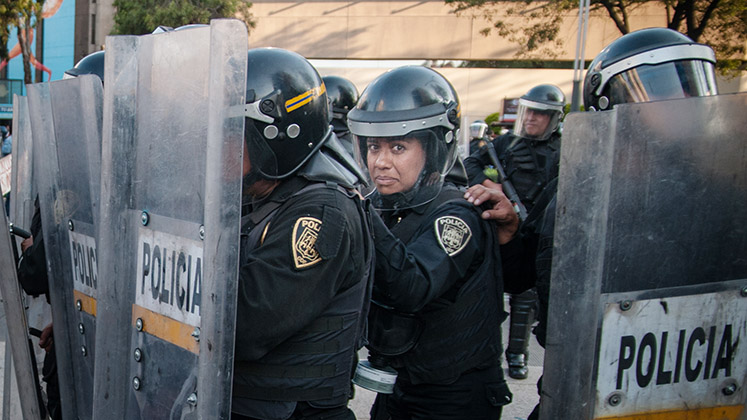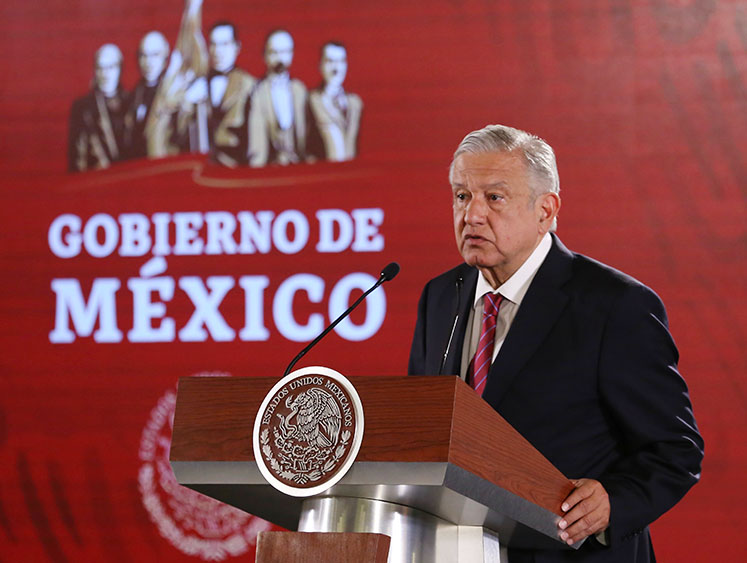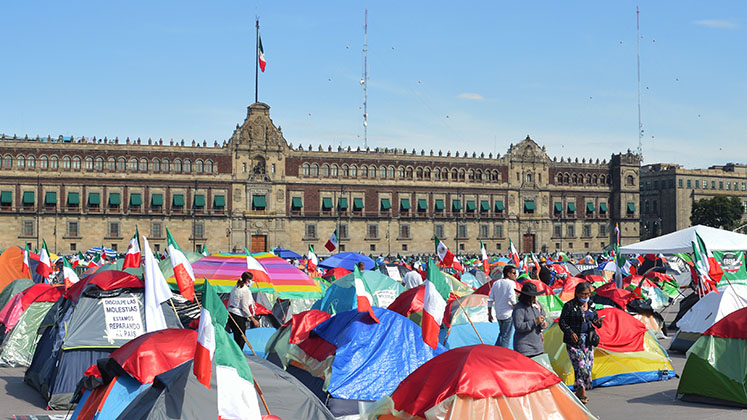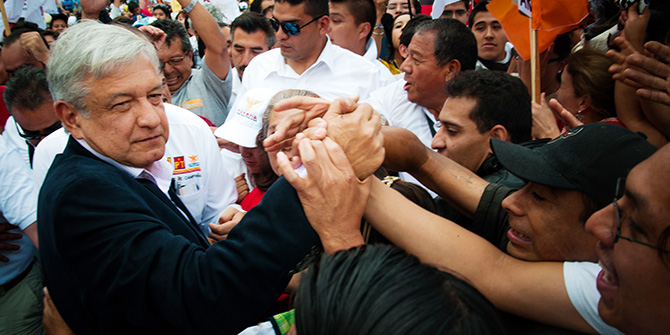
 If Joe Biden and Andrés Manuel López Obrador are to rescue moribund US-Mexico security cooperation, they will need to meet each other halfway in any new agreement, write Yulia Vorobyeva (Florida International University) and Ryan Berg (American Enterprise Institute).
If Joe Biden and Andrés Manuel López Obrador are to rescue moribund US-Mexico security cooperation, they will need to meet each other halfway in any new agreement, write Yulia Vorobyeva (Florida International University) and Ryan Berg (American Enterprise Institute).
In a recent press conference, Mexico’s president Andrés Manuel López Obrador (AMLO) derided the Mérida Initiative – the country’s security cooperation framework with the US – for adopting a militarised approach to organised crime instead of focusing on the development and wellbeing of the Mexican people. The Ministry of Foreign Affairs followed this up by announcing that the Mérida Initiative had officially ended, as it was no longer meeting Mexico’s needs.
The relationship has been fraught with mutual distrust, culminating in the recent arrest and the subsequent release of former Mexican Secretary of Defence General Salvador Cienfuegos, accused of high-level corruption by US authorities. However, despite the differences, it has never been more important for US-Mexico security cooperation to reach for the defibrillator, and finding common ground could be easier than it might initially seem.

AMLO and the “War on Drugs”
In 2019, AMLO declared an end to the “war on drugs” in Mexico. Throughout his presidency, he has been critical of previous governments and advocated a “softer” approach to security, focused on using social policy to prevent crime and delinquency. That said, he has remained reticent to outline the details of such a strategy and instead expanded the Mexican Army’s power to unprecedented levels.
One of the few things that AMLO has articulated is the extent to which he would like to reduce the US role in Mexico’s security. Recent legislation, which was fast-tracked through Mexico’s Congress, aims to hamper US counter-narcotics investigations on Mexican territory by reducing immunity for officers of the Drug Enforcement Agency and curtailing the ability of Mexican officials to cooperate without prior approval. However, with Mexican criminal groups in control of large swaths of the country’s territory and homicide rates shattering records despite COVID-related lockdowns, effectively ending security cooperation will save neither Mexican nor American lives.
Despite the mutual recriminations, the tough reality is that a Mérida-style security agreement remains the best opportunity for Mexico and the US to jointly address their highly interdependent security concerns. Rather than abandoning the principles of “shared responsibility”, both countries should rethink and renegotiate bilateral security cooperation for the next decade.
The Mérida Initiative
The Mérida Initiative, signed in 2007, deepened and institutionalised security assistance from the US to Mexico. Previously, Mexico’s deep-rooted concern for sovereignty over internal affairs had meant that it was not a major recipient of US security funds. Under Mérida, security assistance has totalled nearly $3 billion and run the gamut from traditional military hardware to institution building, anti-money laundering operations, prison reform, and an ambitious modernisation of Mexico’s judicial system.
Bilateral assistance has been organised around four main pillars:
- Disrupting the capacity of organised crime
- Improving and sustaining the rule of law
- Creating a 21st century border structure
- Building strong and resilient communities
The first pillar sought to roll back the gains of Mexico’s potent criminal groups by transferring high-end equipment, sharing intelligence, and conducting joint law-enforcement operations. Both countries tout the capture of cartel kingpins and major seizures of US-bound drugs as examples of success. Still, the toll in Mexico can be seen in astronomically high homicide figures, as criminal organisations diversify their activities and become increasingly fragmented, due in part to neglecting the middle operational layer of cartels in favour of arresting kingpins. The US, meanwhile, continues to see tens of thousands of overdose deaths every year.

The second pillar aimed to bolster key institutions of internal control, including reform of Mexico’s badly broken criminal justice system. The US helped to develop national training standards for Mexico’s police, prosecutors, and judges, as well as leveraging the attraction of accreditation to encourage reform. Hundreds of millions of dollars have been spent on increasing the use of forensics in evidentiary procedure and boosting the capacity of special crime-scene units. Nevertheless, impunity continues to reign: it is estimated that only 1% of crimes are reported and solved, with cases often stymied by government officials that are too easily co-opted by well-financed cartels. The arrest of General Cienfuegos manifested worrying levels of criminal penetration in Mexico’s state institutions. Further, the volume of criminal cases easily overwhelms Mexico’s judiciary. Clearly, much still needs to be done to strengthen the rule of law in Mexico.
Mérida’s third pillar is another longstanding focus of US-Mexico security cooperation. Although over $200 million have been allocated to modernisation of Mexico’s air, land, and sea borders, they remain woefully understaffed and are increasingly reliant on the military. A Bilateral Executive Steering Committee meets annually to develop binational action plans, but collaboration in these areas has been fraught with resentment since construction of a border wall became the centrepiece of the US response. This has damaged the security relationship and exacerbated a humanitarian catastrophe on the US’ doorstep, while doing little to solve the issues that cause people to migrate in the first place.
By shortsightedly choosing to view progress through the lens of immigration, the US also diverted the attention of Mexican law enforcement away from flows of drugs to the north and guns to the south. While Mexican cartels diversify into fentanyl and heroin to meet US demand, thousands of US-based arms dealers are meeting the growing demand from cartels for assault rifles. Territorial contestation between groups coupled with the ineffectiveness of Mexico’s state institutions creates an ideal market for US-made weapons, with one recent study by the Mexican government estimating that 2.5 million illicit weapons have been trafficked across the border.
While modernising border checkpoints is essential to countering illicit flows, the Mérida Initiative paired this effort with a focus on the underlying conditions that drive these flows. This fourth pillar has seen the US Agency for International Development fund projects on crime prevention and human rights, while also providing technical assistance to NGOs in Mexico. Its budget, however, has tended to lag behind military assistance. Between 2014 and 2018, it accounted for roughly one third of the total US funds allocated to security cooperation with Mexico. Given the need to address socioeconomic factors in tackling persistent crime, this neglect is puzzling. If the US is committed to achieving a more balanced approach to its security cooperation with Mexico – something which could also earn AMLO’s endorsement – then channelling 50% of the total funds into long-term community-based interventions would be a good place to start.

Tapping into the popular sentiment against pervasive corruption, violence, and a lack of opportunities has helped AMLO maintain a 64% approval rating during the most violent year in the country’s history. Even though AMLO’s rhetoric frequently contradicts his actions, the Mexican president’s discourse provides a potential bridge between US and Mexican interests. Economic and social development could bring policymakers from both sides of the border together to chart a course towards a deepening of preventive policies.
The future of US-Mexico security cooperation
In rejecting the Mérida Initiative, AMLO’s goal is to reduce the US role in Mexico’s security policies, which have increasingly gone awry even as military involvement has intensified. The good news is that the US Congress and President-elect Biden are both disposed to continue cooperation on joint security challenges, and AMLO’s new counterpart in Washington may prove amenable to renegotiating current arrangements. Any revived framework must be forward-looking and take full stock of the new complexities in Mexico’s criminal landscape and the lessons learned from years of the Mérida Initiative.
While it is clear that AMLO does not want joint interdiction efforts to dominate bilateral security discussions, they remain a necessary component of any serious plan to implement a balanced approach to public security. Intelligence sharing based on mutual trust is a major prerequisite for such cooperation. Although restoring confidence may be challenging in the short term, the US should signal its intent to engage in an equal-partner dialogue by focusing any new framework on institution building and social services, especially at the local and state levels. Increased cooperation on social development will bring tangible results in countering criminal groups and will contribute to firming up the long-term security partnership.
The US should also nudge AMLO towards focusing his anti-corruption rhetoric and his country’s beefed-up financial intelligence unit on anti-money laundering efforts and high-profile corruption cases, including within the Mexican Army. Like other criminals, Mexican cartels have also taken full advantage of an opaque international financial system and the advent of cryptocurrencies; a concerted US effort to prevent criminal groups and their government enablers from enjoying their ill-gotten gains could dovetail nicely with the strong focus on institutional corruption that is so central to AMLO’s persona.
Given his experience in the region, President-elect Biden has the capacity to rescue moribund US-Mexico security cooperation. His first task will be to convince AMLO of the urgent need for a new framework and then to meet him halfway. The two partners can call the agreement whatever they like, but without finding common ground, both countries risk allowing Mexico’s cartels to perpetrate even greater violence and bloodshed than they do today.
Notes:
• The views expressed here are of the authors rather than the Centre or the LSE
• Please read our Comments Policy before commenting





